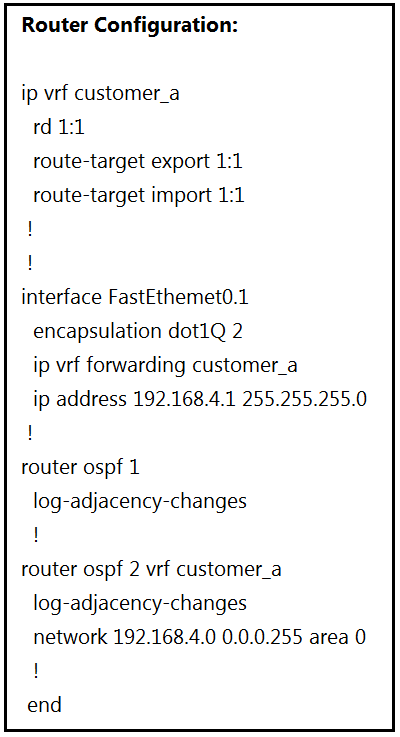
Refer to the exhibit. The network administrator configured VRF lite for customer A. The technician at the remote site misconfigured VRF on the router.
Which configuration will resolve connectivity for both sites of customer_a?
A.
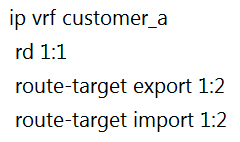
B.
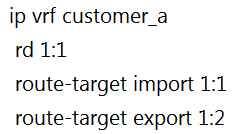
C.
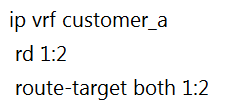
D.
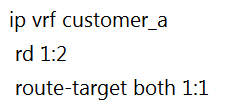

Refer to the exhibit. The network administrator configured VRF lite for customer A. The technician at the remote site misconfigured VRF on the router.
Which configuration will resolve connectivity for both sites of customer_a?
A.

B.

C.

D.

To achieve connectivity for both sites of customer_a using VRF Lite, the route-target values on both ends must match for importing and exporting routes. Therefore, the correct configuration is as follows: 'ip vrf customer_a, rd 1:1, route-target both 1:1'. This ensures that the routes are correctly imported and exported between the two sites, resolving the connectivity issue.
How do any of the answers have anything to do with the question ? Unless we see the import/export route target on the remote PE, any of these answers could be correct.
The given answer is correct rd local significance rt same both ends
A or D is the answer, but it is unclear whether this Config is on the network administrator's side or the remote technician's side.
Since VRF customer_a is exporting and importing with a Route Target of 1:1, the remote device must also be exporting and importing with a Route Target of 1:1. So, the answer is D.
Rt can be same on both routers, correct answet
Without seeing the other side the router configs, it is impossible to decide what should be configured on CE router
is D: The network administrator configured VRF lite for customer A. The technician at the remote site misconfigured VRF on the router. Which configuration will resolve connectivity for both sites of customer_a?
For basic VRF-lite there is no need to specify RD or export import targets. So the questions missing context. It seems they do some kind of route leaking and require this at both ends. Just reading the question again, you should assume there is a requirement of route leaking with MP-BGP. Note sure, but personally this far more complex than basic VRF-lite.
As Masashi_O is saying if we were doing some leaking we would not use the import and export route target as both, in this case they just want to let the same VRF talk using MPLS. Even if the RD is 1:2 it does not matter, what make the things work is the route target, the route-target make the decision to receive something or send something. The RD just identify the VRF of the prefix
The route-target at remote site connot export route-target 1:2 only, because our router imports route-target 1:1. the remote site MUST export 1:1 (and others if it desires)
D is correct